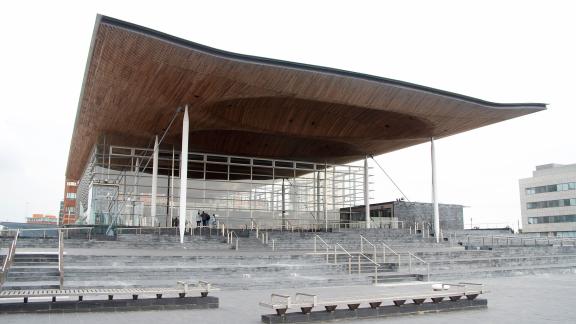Response on the LCM for the Nationality and Borders Bill
Introduction
1. The Welsh NHS Confederation welcomes the opportunity to respond to the letter from the Health and Social Care and Children, Young People and Education Committees seeking our views on LCM for the Nationality and Borders Bill.
2. The Welsh NHS Confederation represents the seven local health boards, three NHS trusts, Digital Health and Care Wales and Health Education and Improvement Wales (our Members). We also host NHS Wales Employers.
Overall views on part 4 of the Nationality and Borders Bill
The establishment of a National Age Assessment Board
3. Although immigration is a reserved matter, it is important to consider the elements of devolved policy which are fundamental to the age assessment process and will be impacted as a result of any decision. Therefore, Members felt it was crucial that the UK and Welsh Government discuss how the National Age Assessment Board will engage with Wales and Welsh organisations. The establishment of the Board will require consultation with partners, including the Welsh Local Government Association, Health Boards, Public Health Wales, third sector providers etc. The impact of not doing so carries the risk of establishing a different approach to the consideration of asylum applications in England to Wales, in relation to the definition of how age is assessed.
The making of Regulations by the Secretary of State in respect of procedures to be followed in the age assessment process
4. It is not clear under what powers the Secretary of State would be able to make Regulations that may impact areas that are devolved to Wales, namely health, local government and social services.
5. Members felt there would need to be a legislative process to work through this as identified in the memorandum. Public Health Wales (PHW) have expressed reservations about the power to make Regulations reverting to UK Government as the UK Government proposals include use of scientific methods to establish age.
The use of scientific methods to establish age; and proposals to reform appeals arrangements. Impact on areas of devolved competence
6. Members have raised concerns surrounding the use of so-called ‘scientific’ methods to assess age until such a time when compelling evidence is available, with their current reliability disputed. It is felt that age assessment is too imprecise to base access to essential services on its outcome. PHW has previously advised that methods such as dental examination, bone density and other previously suggested methods of scientific evaluation are not underpinned by robust and scientific evidence to merit an intervention that would be supported by Welsh partners. There is additional evidence from various sources about the inappropriateness of medical examination as part of age assessment in the Welsh Government’s Age Assessment Toolkit.
7. Members also highlighted that a standardised approach with a standard age assessment panel appears to be taking the view that those seeking asylum will withhold the truth about their age. However, there are important cultural differences which may lead to a child being vague about the date they were born. In 2001, UNHCR estimated that there were about 40 million unregistered births around the world. In some places calendars are not used and the passing of time is measured by seasons rather than calendar dates.
Impact on areas of devolved competence
To what extent the proposals set out in the Bill could undermine the Senedd’s devolved responsibilities by requiring referral of age-disputed children to other decision-makers, including the establishment of a National Age Assessment Board?
8. With Wales working to become a Nation of Sanctuary, concerns have been expressed by Members that the Bill could interfere with the ability of the Welsh Government, and partners, to bring about that vision. Again, conversations are required between the UK and Welsh Government to determine where this Bill crosses into areas of devolved competence, the expectations that may be placed on Welsh public servants, and the interface with existing Welsh Government legislation; namely the Social Services and Wellbeing Act 2014 and the Wellbeing of Future Generations Act 2015.
To what extent it could undermine the requirements placed on Welsh local authorities set out in the Social Services and Wellbeing (Wales) Act 2014 which determines whether children have care and support needs which need to be met?
9. Members have highlighted that that the responsibility of the support and care for children and adults who seek sanctuary in Wales is the responsibility of Welsh Government, with age assessment currently carried out by social services in Wales. It is understood that it is not in the competence of the UK Government to designate other bodies to do an assessment that would interfere with the Welsh Government competence in social care without consent.
10. There are concerns that the proposals set out for age assessment may increase the numbers of those who have No Recourse to Public Funds, as distrust in services becomes a barrier to access. PHW’s work on violence against migrant, refugee and asylum seeking women highlights the increased risk such an outcome for this group.
UN Convention on the Rights of the Child
Your views on whether the proposals will undermine compliance with the UN Convention on the Rights of the Child to act in the best interests of children.
11. Members have highlighted that various rights may be threatened by the UK Government’s approach, some of which are enshrined in Welsh legislation. For example, the Social Services and Well-being Act imposes a specific duty requiring those exercising any function under the Act to have due regard to the UNCRC, including Article 12 which affords children the right to be listened to and participate in decisions affecting them. The UNCRC appears to be undermined by any proposal to include ‘scientific’ methods, as the Committee on the Rights of the Child confirmed in 2017: “States should refrain from using medical methods based on, inter alia, bone and dental exam analysis, which may be inaccurate, with wide margins of error, and can also be traumatic and lead to unnecessary legal processes” (Age Assessment Toolkit, 2021).
12. Members awarded the Welsh Government Participation Standards for Children and Young People, which is underpinned by the UNCRC, have also raised questions as to whether a Health Board would be contravening these rights by ‘requiring’ a young person to comply with invasive testing before being able to access services.
13. Health Boards and local authorities would require clear guidance on the responsibilities to children and young people regardless of their status. The removal of citizenship change in the Bill is of particular concern as this may disrupt care for those people and can affect children as much as adults.
14. Members raised concerns that the Bill appears to penalise asylum seekers and refugees and discriminate between categories of asylum seekers, which is contrary to international law and violates the UK’s commitments under the UNCRC.
15. It was highlighted that no parallel Child Rights Impact Assessment was published alongside the Equality Impact Assessment for the Bill, with no provision to suggest that a Child Rights Impact Assessment will be made under the new rules or regulations.
‘Scientific’ methods and assessments
Use of “scientific methods” to determine age and anticipated implications for local authorities and the NHS.
16. Concerns were raised by Members around the ability for healthcare providers to build trusting relationships with unaccompanied asylum-seeking children if the NHS is required to carry out any element of the age assessment.
17. Trusting relationships between health professionals and patients are a key enabler of access to health and a lack of trust could drive hesitancy in seeking healthcare or public health interventions, such as vaccines. Members have also said consideration needs to be given to the consent required of young people to undergo these potentially invasive procedures and the potential resource implications. Members were also concerned about whether Health Board staff would be ethically prepared to be involved as it may not be in the best interest of the child to undergo an age assessment which would stand contrary to the ‘Do Not Harm’ principle.
18. Members also highlighted that NHS organisations may need to create a specified electronic health record for those individuals under the assessment process. A separate database may be required for associated data capture and assessment, so that a record of decision making can be maintained and scrutinised when required, especially if the assessment entails a similar approach where individuals are subjected to radiation via X-ray and other imaging technology which rely on other forms of ionizing radiation. Information may also need to be interoperable with other UK administrations if assessment processes are combined or centralised across borders.
19. There were also concerns raised by our Members about how and where age assessments for children and young people in Wales were carried out (e.g within primary care, community paediatrics, radiology etc).
Implications for mental health and community cohesion
To what extent the proposals would undermine community cohesion in Wales.
20. Members highlighted the recent experience around the use of Penally Camp in Pembrokeshire (and in the Hywel Dda University Health Board area) as an example of how divisive the issue of ‘age’ and legitimacy’ can be. It also demonstrated how polarised views within a host community can manifest in extreme acts, impacting on an already traumatised group. There were also concerns over potential increased numbers of asylum seekers being placed in similar unsuitable accommodation and not having access to appropriate health assessment or screening for mental health issues as well as physical health issues.
21. The continued focus on the legitimacy and whether an individual is deserving of compassion and support on account of their age is a damaging and dehumanising position that values the life of one person over another. This has implications for public health in terms of protecting and improving health at the population level and system leadership of health services who are trying to support and help all members of the community.
The potential mental health impact for those who are age-disputed.
22. Members did have concerns around any procedure that may re-traumatise individuals or suggest there is clarity around what is still a debated procedure for determining age in terms of the evidence base. It could also lead to practice that does not take into account the significant physical and mental impact that toxic stress and trauma can have on children and young people that may affect their physical appearance. Some age assessments carried out by the Home Office have been subject to dispute, with inaccurate age assessment leading to a delay in the person being able to access the essential services they require. This has implications for NHS resources as the opportunity to avoid escalation and more resource-intensive intervention is required to protect and improve the mental health of those who are age-disputed. Age assessment must then lead to a rapid and accurate decision so the age-disputed person can begin the process of integration.
23. The definition of a ‘child’ in terms of traumatised people is complex and the transition from children to adult mental health services may not reflect that persons’ social, emotional and educational attainment. It is simply not clear cut in terms of the experience of these young people to define some as a child one day and an adult the next.
24. The Bill also does not make it clear as to how the mental health and wellbeing of children will be protected during the assessment process, with Members reporting the mental deterioration, self-harm and suicidal ideation of young people being witnessed by clinical colleagues.



